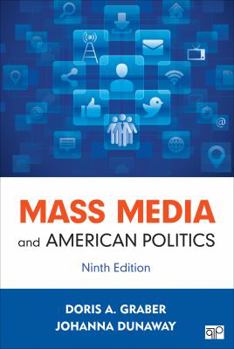Mass Media and American Politics
Select Format
Select Condition 
Book Overview
This comprehensive, trusted core text on media′s impact on attitudes, behavior, elections, politics, and policymaking is known for its readable introduction to the literature and theory of the... This description may be from another edition of this product.
Format:Paperback
Language:English
ISBN:1452287287
ISBN13:9781452287287
Release Date:September 2014
Publisher:CQ Press
Length:464 Pages
Weight:1.40 lbs.
Dimensions:0.9" x 6.0" x 8.9"
Customer Reviews
2 ratings
A Good All-Inclusive Introductory Text
Published by Thriftbooks.com User , 20 years ago
This well-compiled textbook gathers basic theoretical introductions to all aspects of the relationship between the American media and the political system. Included are basic mass communication concepts such as agenda setting and gatekeeping, which are then projected into larger media trends and governmental/media interactions in all relevant directions. The book provides descriptions of how government affects media (ownership regulations, First Amendment rules, libel laws), how media affects government (building of public opinion, muckraking, watchdog responsibilities), and how the connections between government and media affect the public (opinion patterns, voting behavior, political knowledge levels). One recurring problem here is that the book is often noncommittal in describing contentious political issues, which is a result of trying to present arguments from all sides. This tends to reduce the perceived importance of some crucial issues in the reader's mind, especially problems with media ownership patterns in recent years, and issues arising from modern deregulation. Meanwhile, the book's sectional arrangement, as is true for many textbooks, leads to a fair amount of repetition and re-explanations of basic concepts (a real problem in the adjoining chapters for the different branches of government, for example). In any case this book is a very useful introduction to a wide range of theoretical areas, and impressively prepares the reader for more in-depth research endeavors. [~doomsdayer520~]
Mass Media and Politics: Shall We Dance?
Published by Thriftbooks.com User , 24 years ago
Graber's dissertation clearly illustrates how the mass media effects individual beliefs, attitudes, and activities. Consider how much of the working day is spent discussing top news stories, political issues, and social situations. The average American spends seven hours of exposure per day to some form of mass media news or entertainment [television, newspapers, magazines, radio, etc.] (p.2). Taking this into consideration, the average individual will usually talk about that which they are most familiar, or that in which they are most interested. Based on these statistics, it is inevitable that news stories will be the topic of discussion, thus influence, in American's daily life.Using children as an analogy, the fighting, bickering, fingerpointing, and blaming stops when someone is in trouble. Then trouble comes around, Americans band together, becoming unpenetrable to the adversary. Graber points this out in the chapters on Foreign Affairs Coverage and Crisis Coverage. Everyone has experienced a time of 'crisis', either locally, nationally, or globally. Once a crisis occurs, newspapers, magazines, talk shows, radio, etc. band together. This one aspect keeps America free, and democratic.I agree with Graber that the mass media effects individual beliefs, attitudes, and activities. She has proven her point effectively.






